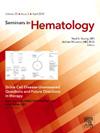超越 HMAs:新的靶点和治疗方法。
IF 4.1
3区 医学
Q1 HEMATOLOGY
引用次数: 0
摘要
骨髓增生异常综合征/肿瘤(MDS)是一组异质性克隆性造血疾病,其临床特征和预后变化极大。MDS 的治疗主要是根据国际预后评分系统(International Prognostic Scoring System-Revised)和最近的分子国际预后评分系统(Molecular International Prognostic Scoring System)对患者进行风险分层,将其分为低风险或高风险两类。低危 MDS 通常以改善细胞减少症和提高生活质量为目标进行治疗,而高危 MDS 则以延长生存期和延缓发展为急性髓性白血病(AML)为目标进行治疗。针对低风险 MDS 患者的治疗策略包括红细胞生成刺激剂、鲁帕特罗、来那度胺(适用于特定患者)。此外,伊美司他最近也被纳入了美国食品及药物管理局批准的低风险 MDS 治疗方案。对于高风险的 MDS,低甲基化药物的单药治疗仍然是治疗的标准。虽然在大型随机三期临床试验中已经和正在研究几种新型的低甲基化药物组合,包括阿扎胞苷和 Venetoclax 的组合,但迄今为止还没有任何组合的总生存率比阿扎胞苷单药治疗有所提高。此外,生物标志物导向疗法和单体治疗方法目前也正在早期试验中进行评估。尽管最近取得了一些进展,但治疗药物的缺乏,尤其是高风险 MDS 一线治疗失败后治疗药物的缺乏,仍然是 MDS 治疗的主要障碍。在这篇综述中,我们讨论了 MDS 目前的治疗情况,并概述了目前正在临床开发的新型药物,这些药物有可能改变我们目前的治疗模式。本文章由计算机程序翻译,如有差异,请以英文原文为准。
Beyond HMAs: Novel Targets and Therapeutic Approaches
Myelodysplastic syndromes/neoplasms (MDS) constitute a heterogeneous group of clonal hematopoietic disorders with extremely variable clinical features and outcomes. Management of MDS is largely based on risk stratification of patients into either lower-risk or higher-risk categories using the International Prognostic Scoring System-Revised and, more recently, on the Molecular International Prognostic Scoring System. Lower-risk MDS is often managed with the goal of ameliorating cytopenias and improving quality of life, while higher-risk MDS is treated with therapies aimed at extending survival and delaying progression to acute myeloid leukemia (AML). Therapeutic strategies in lower-risk MDS patients may consist of erythropoiesis stimulating agents, luspatercept, and lenalidomide for selected patients. Furthermore, imetelstat has recently been added to the FDA-approved therapeutic armamentarium for lower-risk MDS. In higher-risk MDS, monotherapy with hypomethylating agents continues to be the standard of care. While several novel hypomethylating agent combinations have and are being studied in large randomized phase 3 clinical trials, including the combination of azacitidine and venetoclax, no combination to date have improved overall survival to azacitidine monotherapy. Moreover, biomarker-directed therapies as well as immonotherapeutic approaches are currently being evaluated in early phase trials. Despite recent advancements, the lack of therapeutic agents, particularly after the failure of first line therapy in higher risk MDS, continues to be a major hurdle in the management of MDS. In this review, we discuss the current treatment landscape of MDS and provide an overview of novel agents currently in clinical development that have the potential to alter our current treatment paradigms.
求助全文
通过发布文献求助,成功后即可免费获取论文全文。
去求助
来源期刊

Seminars in hematology
医学-血液学
CiteScore
6.20
自引率
2.80%
发文量
30
审稿时长
35 days
期刊介绍:
Seminars in Hematology aims to present subjects of current importance in clinical hematology, including related areas of oncology, hematopathology, and blood banking. The journal''s unique issue structure allows for a multi-faceted overview of a single topic via a curated selection of review articles, while also offering a variety of articles that present dynamic and front-line material immediately influencing the field. Seminars in Hematology is devoted to making the important and current work accessible, comprehensible, and valuable to the practicing physician, young investigator, clinical practitioners, and internists/paediatricians with strong interests in blood diseases. Seminars in Hematology publishes original research, reviews, short communications and mini- reviews.
 求助内容:
求助内容: 应助结果提醒方式:
应助结果提醒方式:


